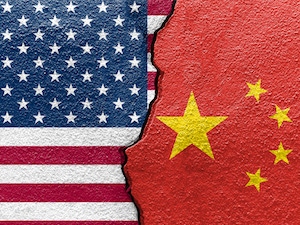Tariffs on China and ensuing retaliation could compromise competitive edge of U.S chemical products and cost jobs, says American Chemistry Council (ACC; Washington, DC).
June 18, 2018

 “Trade wars are good, and easy to win,” blithely tweeted President Trump in March of this year. Well, it looks like we are on course to find out if that is, in fact, true, which has the American Chemistry Council (ACC; Washington, DC) deeply worried.
“Trade wars are good, and easy to win,” blithely tweeted President Trump in March of this year. Well, it looks like we are on course to find out if that is, in fact, true, which has the American Chemistry Council (ACC; Washington, DC) deeply worried.
On June 15, the Trump administration revealed a number of Chinese products that would be subject to U.S. tariffs. The lists include a wide swathe of polymers as well as plastic products such as tubing and and film. This new round of tariffs, estimated to total $16 billion, is in addition to $34 billion in tariffs announced in April that include plastics processing equipment and molds. China has announced that it will retaliate with its own tariffs on $34 billion worth of U.S. products, including soybeans, whiskey and electric cars. Additional tariffs on more items, including chemical products and medical equipment, will be announced later.
“With the release today of a second list of 284 proposed tariff lines, which includes a large amount of plastics, lubricating oils and other chemicals valued at $2.2 billion, the administration has now pit U.S. chemical manufacturing directly against China at the front lines of this conflict,” wrote the ACC in a press release issued on June 15. “We appreciate, and will vigorously utilize, the opportunity to share our comments and concerns with the Office of the U.S. Trade Representative and others in the coming weeks to prevent this situation from escalating further.”
The core issue for the ACC is that the United States’ competitive edge in chemical products—lower costs for U.S. feedstock and chemical production facilities—may be compromised by a trade war. Chemistry is one of the United States’ top exporting industries, accounting for 14% of all U.S. exports. China, adds the ACC, is one of our most important trading partners in this sector, “importing 11%, or $3.2 billion, of all plastic resins in 2017.” Retaliation from China could result in the loss of as many as 24,000 U.S. jobs in the chemicals and downstream sectors because of a downturn in demand for these products, argues the ACC. It urges the administration and Congress to halt what it calls this “destructive trade war.”
By imposing these tariffs, U.S. Trade Representative Robert Lighthizer and the Trump administration hope to pressure China to enter into meaningful negotiations to reduce the trade deficit and stop theft of intellectual property.
However, investors expect the spat to come at the expense of U.S. oil firms, pulling down the share prices of ExxonMobil and Chevron by 1 to 2 percent since Friday, while U.S. crude oil prices fell by around 5 percent, reported Reuters yesterday. “The Chinese may just replace some of the American oil with Iranian crude,” John Driscoll, Director of consultancy JTD Energy Services, told Reuters.
“China isn’t intimidated by the threat of U.S. sanctions. They haven’t been in the past. So in this diplomatic spat they might just replace U.S. crude with Iranian oil. That would obviously infuriate Trump,” said Driscoll.
About the Author(s)
You May Also Like




